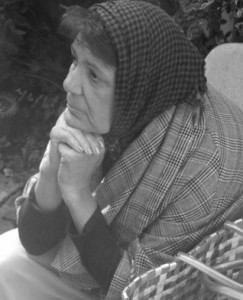Benedict Nightingale, reviewing the new London theater season for the New York Times in 1999, put his finger on the big trouble with Rose, Martin Sherman’s one-woman play about an 80-year old Holocaust survivor sitting on a park bench in Miami and remembering the high and low points of her extraordinary life.
 “Rose’s life sometimes seems too exemplary to be true,” Nightingale writes. “Add some convenient coincidences to her tale — like meeting a bitter old shopkeeper in the Arizona desert and realizing he is the spouse she thought she had lost to Dachau — and Rose could easily be a case study rather than a character.”
“Rose’s life sometimes seems too exemplary to be true,” Nightingale writes. “Add some convenient coincidences to her tale — like meeting a bitter old shopkeeper in the Arizona desert and realizing he is the spouse she thought she had lost to Dachau — and Rose could easily be a case study rather than a character.”
But Nightingale also saw beyond Sherman’s desire to embrace the entirety of the post-Holocaust Jewish dilemma in a single overstuffed play, instead championing the drama’s extraordinary heart and the quietly stunning performance of its star, Olympia Dukakis — “the permafrost beneath the surface, the Siberia in her soul.”
He praised Rose for its “always lively, often distressing, sometimes hauntingly strange observation,” and concluded: “If you think that sedentary bravura is a contradiction in terms, this should change your mind.”
England liked Rose. It was nominated for the Olivier Award for best new play, and moved in 2000 to New York, again with Dukakis, where its reception was chillier. Bruce Weber, also writing in the New York Times, reacted like this: “(H)er story resonates on the tired frequency of a lecture about the wages of forgetting the past. If you are not of a certain age, you may react to her as a child to a relative who has overtaken one too many family gatherings: Yes, Grandma. Now can we go out and play?”
Then, echoing a theme sounded by several reviewers, he lamented the script’s streaks of jokiness amid the general despair: “Either Mr. Sherman is talking through her, or else in the year it took Rose to become fluent in English, she assimilated a lifetime of Borscht Belt humor.”
Well, maybe. But then, Rose is 80 years old when she sits shiva on that park bench, and she’s lived in America for most of her adult life. And Borscht Belt humor doesn’t come just from the Catskills. The Catskills are only a pipeline to older places and older times, where that peculiarly Jewish humor of survivors’ exaggeration was born and nourished before it immigrated to summer camps on American lakes. So Rose couldn’t be a little funny? So she shouldn’t be a little funny? Jews have been laughing about the unlaughable for a long, long time. It’s one way you get through.